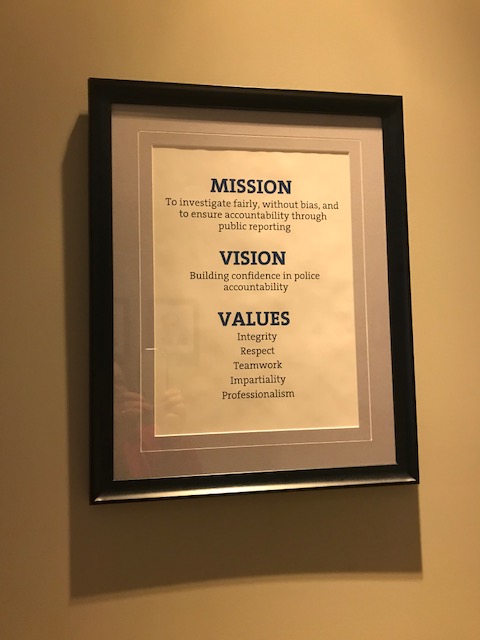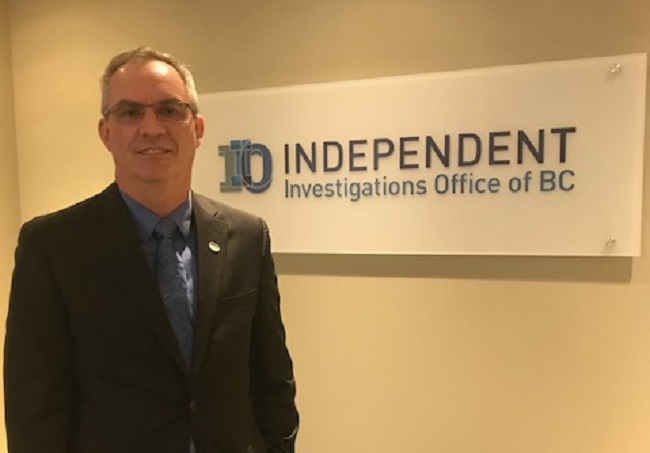The new head of B.C.’s civilian police watchdog is settling into the job with a goal to increase transparency at the agency.

Ron MacDonald began his appointment as the chief civilian director of the Independent Investigations Office (IIO) on Oct. 24.
A former Crown lawyer, MacDonald came to B.C. after a six-year stint as the director of Nova Scotia’s Serious Incident Response Team (SiRT), which fulfills a similar role as the IIO.
LISTEN: An interview with the new head of B.C.’s civilian police watchdog
As one of his first steps, MacDonald wants to make the IIO’s reports shorter and easier to read.
“So now when we report out to the public on one of our cases, the reports will likely be four to six pages long and written in language we believe is more appropriate for the audience we want to hit,” he said.
WATCH: IIO report on Skytrain machete incident

Along with improving public access to the agency’s work, MacDonald said he is looking to improve public confidence in civilian oversight of police.

Get breaking National news
The IIO is legally required to probe cases in which a member of the public is killed or seriously injured through contact with police.
“One of our very important roles is to ensure the public understands each one of these cases where there is serious injury or death, they understand why the police didn’t do anything wrong,” MacDonald said.
The IIO does not recommend charges, but in cases where an officer may have committed an offence, it forwards a report to Crown prosecutors who will then decide whether a case will proceed.

Improving relations with police
In addition, MacDonald said he will work to improve the IIO’s relationship with the province’s police forces.
“Our cases always start with the police,” he said.
“They are the ones who report them to us, so it’s incredibly important to us to have a respectful and professional relationship with them.”
That may not be a simple job.
The IIO is currently involved in a pair of legal battles with the Vancouver Police Department (VPD) over witness officer testimony.
WATCH: Myles Gray’s family still searching for answers

One case relates to the death of 33-year-old Myles Gray, who died after an altercation with VPD officers near Boundary Road in 2015.
The other relates to the death of 38-year-old Daniel Rintoul, who was shot by police after he allegedly stabbed an officer and an employee at an East Vancouver Canadian Tire in 2016.
The second case prompted Vancouver police Chief Adam Palmer to pen a letter slamming the IIO, accusing the agency of “a lack of investigative competence.”
WATCH: VPD chief writes scathing letter to IIO

In both cases, the IIO has filed petitions to the B.C. Supreme Court regarding witness officers — who were present, but not personally involved in the men’s deaths — and who refuse to be interviewed by the agency.
Representatives for the officers say it is unfair to force them to go on record without allowing them to review notes and other materials such as dispatch audio and incident video related to the deaths.
The IIO has called on the court to compel the officers to be interviewed, arguing officers have “a duty under the Police Act to cooperate fully with the IIO” without conditions.
- Shooting at Rhode Island ice rink kills 2 during youth hockey game: police
- Anti-feminist ideology ‘increasingly relevant’ to national security: CSIS
- Savannah Guthrie issues new plea for mother’s return as police clear family
- Tumbler Ridge shooting fuels misinformation about trans people, organization says













Comments
Comments closed.
Due to the sensitive and/or legal subject matter of some of the content on globalnews.ca, we reserve the ability to disable comments from time to time.
Please see our Commenting Policy for more.